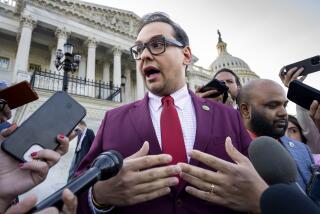Brazil Congress Takes Aim at Corruption : Scandal: Panel recommends 18 legislators be expelled. Move is called an effort to rescue ‘the dignity of the nation.’
- Share via
RIO DE JANEIRO — Tarnished by scandal, its credibility slumping, Brazil’s Congress took a bold step against political corruption Friday when an investigating panel recommended “cutting its own flesh” by expelling 18 legislators caught in a massive kickback and influence-peddling scheme.
The 44-member panel issued its recommendations in a lengthy report that capped a three-month investigation into the shadowy dealings of Brazil’s so-called budget mafia from 1989 through 1992. Weighing five pounds and as thick as an encyclopedia, the 400-page document detailed how a small group of lawmakers, together with bureaucrats and business leaders, conspired to siphon off millions, and perhaps billions, of dollars from the federal budget.
The panel accused the 18 legislators of “breach of parliamentary decorum” and targeted 22 more for further investigation. The panel also recommended measures to impose new strictures on Brazil’s porous budgetary process and even called for disbanding the budget committee.
Panel members hailed the findings as a blow to the succession of scandals that has buffeted the highest offices in Brazil in recent months. One legislator called the report nothing less than a move to rescue “the dignity of the nation.”
Only 13 months ago, President Fernando Collor de Mello was impeached for profiting from a corruption scheme. His former campaign treasurer and alleged partner in crime, Paulo Cesar Farias, was sentenced last month to four years in jail for tax evasion.
The congressional panel has no power to punish the legislators. However, its findings are likely to pave the way for Brazil’s biggest political purge in the nation’s democratic history.
In coming weeks, the full Congress will convene to vote on the fate of the 18 lawmakers.
Opening the panel’s presentation Friday, the chief author of the report, Roberto Magalhaes, read solemnly from the five-volume document. His voice thick with emotion, he quoted Aristotle, Machiavelli and Latin American liberator Simon Bolivar. In a daylong session broadcast on nationwide television, panel members took turns reading until they finished the entire document.
They detailed how lawmakers, bureaucrats and contractors had taken the state by “assault,” pocketing kickbacks in return for channeling budget funds to projects that benefited friends, relatives and clients in a scheme that bled government coffers of hundreds of millions of dollars.
“Some (legislators) came to government already corrupt,” Magalhaes said. “Others were driven to corruption by power.” While private fortunes and interests flourished, he said, the nation had been “orphaned.”
Among those accused in the report were Sen. Ibsen Pinheiro, a former president of the Congress, unable to explain how almost $2.5 million landed in his bank account; Ricardo Fiuza, a former Cabinet minister, accused of illegally inserting more than 300 extra items into the 1992 federal budget, costing taxpayers $240 million; and Congressman Joao Alves, former head of the budget committee and allegedly the don of the budget mafia, who pocketed $50 million.
Government prosecutor Aristides Junqueira is weighing criminal charges against the 18 legislators as well as three former Cabinet ministers, three governors and dozens of local politicians.
Next week, Congress is expected to open another probe into what investigators denounced as a “veritable cartel of contractors” who allegedly bribed legislators to win public bids and hasten the release of budget funds.
Corruption is nothing new in Brazil, but never had it reached so high and spread so wide. When generals ruled Brazil, the legislature had little real power and scant opportunity for scandal. When democracy returned in 1985, Congress was re-enfranchised, and some politicians helped themselves as they helped to forge the nation’s budgets.
The budget scandal broke in early October when Jose Carlos dos Santos, a former aide to the congressional budget committee, admitted taking up to $2.7 million in payoffs for writing budget items on the orders of a gang of lawmakers known, because of their short stature, as the seven dwarfs.
Following Santos’ lead, investigators questioned 48 witnesses, ranging from a congressional chauffeur to former ministers.
A recent poll rated Congress and political parties among the least credible of Brazilian institutions. And voters appear to be acting on their discontent.
“In each of the last three elections, almost 50% of incumbent legislators were voted out of office,” said Alexandre de Barros, a political risk consultant.
More to Read
Sign up for Essential California
The most important California stories and recommendations in your inbox every morning.
You may occasionally receive promotional content from the Los Angeles Times.










